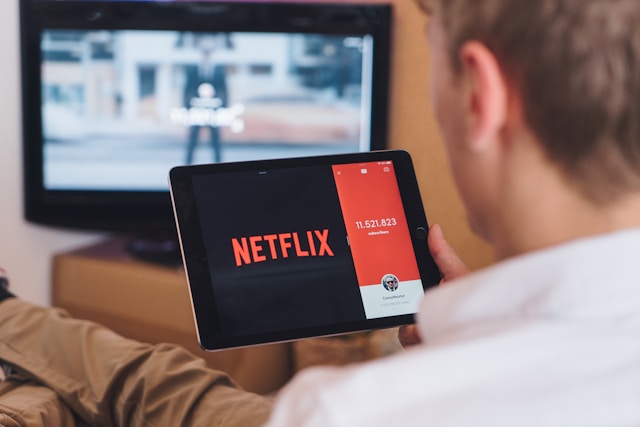Netflix, once a humble DVD rental service, has grown into a global entertainment giant with over 230 million subscribers. Its marketing strategy has been a key driver of this success, blending innovation, data-driven insights, and a keen understanding of audience preferences. For marketing professionals, Netflix offers a masterclass in how to build and sustain a brand in a competitive landscape.
The Power of Original Content
Netflix’s pivot to original content marked a significant shift in its marketing approach. The launch of “House of Cards” in 2013 was a watershed moment. Not only did it show Netflix’s commitment to producing high-quality original content, but it also demonstrated the company’s ability to leverage data to guide creative decisions. Netflix knew from its data that political dramas were popular among its subscribers, and it used this insight to greenlight the series.

This data-driven approach to content creation and marketing is a cornerstone of Netflix’s strategy. By analyzing viewing habits, Netflix can predict what types of content will resonate with different segments of its audience. This leads to a more personalized marketing approach, where trailers, emails, and in-app notifications are tailored to individual preferences. The result is a marketing strategy that feels highly relevant and engaging to each user.
Personalized Recommendations
Netflix’s recommendation algorithm is a powerful marketing tool. By suggesting content that aligns with a user’s viewing history, Netflix keeps viewers engaged and reduces churn. This personalized experience is central to Netflix’s brand promise. The more a user watches, the better Netflix gets at recommending content, creating a virtuous cycle of engagement.
This personalization extends to marketing communications. For instance, Netflix’s email campaigns are not one-size-fits-all. Instead, they feature personalized content recommendations based on the recipient’s viewing habits. This increases the likelihood of clicks and conversions, as the content is more likely to be relevant to the user.
Leveraging Social Media
Netflix’s social media strategy is another key component of its marketing success. The company uses platforms like Twitter, Instagram, and TikTok to engage with audiences in real-time. Netflix’s social media presence is characterized by a playful and irreverent tone, which resonates with its target demographic.
One notable example is the marketing campaign for “Stranger Things.” Netflix created a series of social media posts that played on the show’s 1980s nostalgia, including retro-style posters and interactive content. This not only built anticipation for the show’s release but also encouraged fans to share their excitement, creating organic buzz.

Netflix also engages with fans on social media by responding to comments and participating in trending conversations. This helps to humanize the brand and build a sense of community among its subscribers.
Innovative Advertising
Netflix’s advertising campaigns are known for their creativity and impact. One standout example is the campaign for “Narcos.” To promote the show, Netflix launched a series of billboard ads featuring real surveillance footage from Colombian drug cartels. The tagline, “There’s no business like blow business,” was provocative and attention-grabbing, generating significant media coverage and public interest.
Another innovative campaign was for the film “Bird Box.” Netflix released a series of teaser trailers that hinted at the movie’s premise without giving too much away. This created a sense of mystery and intrigue, prompting viewers to watch the film to find out more. The campaign was a huge success, with “Bird Box” becoming one of Netflix’s most-watched films within the first week of its release.
Collaborations and Partnerships
Netflix often collaborates with other brands and influencers to amplify its marketing efforts. For example, to promote the third season of “Stranger Things,” Netflix partnered with brands like Coca-Cola, Baskin-Robbins, and H&M. These partnerships resulted in a range of co-branded products, from limited-edition Coke cans to “Stranger Things”-themed ice cream flavors and clothing lines. These collaborations not only extended the reach of the marketing campaign but also created additional touchpoints for fans to engage with the show.
Influencer marketing is another tactic Netflix employs effectively. By partnering with influencers who have large and engaged followings, Netflix can tap into new audiences and generate buzz for its content. For instance, Netflix worked with popular YouTubers and social media influencers to promote the release of “To All the Boys I’ve Loved Before,” resulting in widespread awareness and discussion of the film among young audiences.
Data-Driven Decision Making
At the heart of Netflix’s marketing strategy is a reliance on data. Every decision, from content creation to marketing campaigns, is informed by data insights. Netflix collects vast amounts of data on its users, including viewing habits, search queries, and even the time of day they watch content. This data is used to optimize everything from content recommendations to marketing messages.
For example, Netflix uses A/B testing to refine its marketing efforts. By testing different versions of trailers, posters, and email subject lines, Netflix can determine which ones perform best and use that information to improve future campaigns. This iterative approach ensures that Netflix’s marketing is always evolving and improving.
Global Reach with Local Appeal
As Netflix has expanded globally, it has adapted its marketing strategy to appeal to local audiences. This involves not only offering content in different languages but also creating marketing campaigns that resonate with local cultures and preferences.
For example, to promote the launch of Netflix in India, the company created a series of ads featuring popular Bollywood actors. These ads played on local humor and cultural references, making them more relatable to Indian audiences. Similarly, Netflix has created marketing campaigns tailored to other regions, such as Latin America and Europe, to ensure that its messaging is relevant and engaging to local viewers.

Creating Event-Based Marketing
Netflix has mastered the art of event-based marketing, where the release of a new show or movie is treated as a major event. This involves building anticipation through teasers, trailers, and social media posts in the weeks leading up to the release. Netflix often creates countdowns and interactive content to keep viewers engaged and excited.
One example is the release of “The Witcher.” Netflix created a multi-faceted marketing campaign that included trailers, behind-the-scenes footage, and interactive content like quizzes and character profiles. The campaign generated significant buzz and anticipation, leading to a highly successful launch.
Using Technology for Engagement
Netflix leverages technology to enhance viewer engagement and marketing effectiveness. One example is its use of machine learning algorithms to personalize content recommendations and marketing messages. These algorithms analyze user data to predict what content a viewer is likely to enjoy, making the viewing experience more enjoyable and personalized.
Netflix also uses technology to create interactive content, such as the choose-your-own-adventure film “Black Mirror: Bandersnatch.” This type of content not only engages viewers but also generates significant media coverage and social media buzz, further amplifying the marketing impact.
Understanding Audience Behavior
Netflix’s deep understanding of audience behavior is a key factor in its marketing success. By analyzing viewing habits, Netflix can identify trends and preferences that inform its content creation and marketing strategies. This allows Netflix to stay ahead of the curve and consistently deliver content that resonates with its audience.
For example, Netflix noticed a growing interest in true crime documentaries and responded by producing a series of successful true crime shows like “Making a Murderer” and “The Ted Bundy Tapes.” This not only satisfied viewer demand but also positioned Netflix as a leading provider of true crime content.
Building a Strong Brand Identity
Netflix has built a strong brand identity that is consistent across all touchpoints. From its user interface to its marketing campaigns, Netflix’s brand is characterized by a commitment to quality, innovation, and personalization. This consistency helps to build trust and loyalty among subscribers.
Netflix’s brand identity is also reflected in its commitment to diversity and inclusion. The company actively promotes diverse voices and stories, both in its content and its marketing efforts. This not only aligns with the values of many of its subscribers but also helps to attract a broader audience.
Measuring and Optimizing Performance
Netflix’s marketing strategy is driven by a continuous process of measurement and optimization. The company tracks key performance metrics for all its marketing campaigns, from email open rates to social media engagement. This data is used to assess the effectiveness of each campaign and identify areas for improvement.
Netflix also conducts extensive post-mortem analyses of its campaigns to learn what worked and what didn’t. This iterative approach ensures that Netflix’s marketing efforts are always improving and evolving to meet the needs of its audience.
Adapting to Market Trends
Netflix’s ability to adapt to market trends is another key factor in its marketing success. The company is always on the lookout for emerging trends and is quick to capitalize on them. For example, Netflix has embraced the rise of short-form content by producing shows with shorter episodes, catering to viewers with limited time.
Similarly, Netflix has responded to the growing popularity of mobile viewing by optimizing its app for mobile devices and creating mobile-friendly marketing content. This adaptability allows Netflix to stay relevant and meet the changing needs of its audience.
Lessons for Marketers from Netflix
Netflix’s marketing strategy is a masterclass in how to build and sustain a brand in a competitive landscape. By leveraging data, personalization, innovative advertising, and a deep understanding of audience behavior, Netflix has created a marketing approach that is both highly effective and constantly evolving. For marketing professionals, Netflix offers valuable lessons in how to create engaging, relevant, and impactful marketing campaigns that resonate with audiences and drive growth.
1. Leverage Data to Drive Decisions
Netflix’s success is built on its data-driven approach. By analyzing vast amounts of user data, Netflix can predict viewer preferences and tailor content and marketing efforts accordingly. This allows for highly personalized user experiences and more effective marketing campaigns.
Lesson: Utilize data analytics to understand your audience deeply. Use these insights to personalize marketing efforts and create content that resonates with different segments of your audience.
2. Embrace Innovation in Content and Campaigns
Netflix continually innovates, whether through interactive content like “Black Mirror: Bandersnatch” or unique advertising campaigns such as the provocative billboards for “Narcos.” Innovation keeps the brand fresh and engages audiences in new ways.
Lesson: Be bold and creative in your marketing campaigns. Experiment with new formats and technologies to capture and retain your audience’s attention.
3. Build a Strong, Consistent Brand Identity
Netflix has cultivated a strong brand identity characterized by quality, innovation, and personalization. This consistency across all touchpoints fosters trust and loyalty among subscribers.
Lesson: Develop a clear brand identity and ensure it is consistently reflected in all marketing efforts. This builds brand recognition and trust.
4. Engage with Audiences on Social Media
Netflix’s active and playful engagement on social media helps humanize the brand and build a community. By participating in trending conversations and responding to fans, Netflix creates a sense of connection and loyalty.
Lesson: Use social media to interact with your audience in a meaningful way. Be responsive, join relevant conversations, and create content that encourages engagement and sharing.
5. Adapt to Changing Trends and Preferences
Netflix is adept at recognizing and adapting to market trends, whether it’s the shift towards mobile viewing or the popularity of true crime content. This adaptability keeps the brand relevant and ensures it meets the evolving needs of its audience.
Lesson: Stay attuned to market trends and be ready to pivot your strategies to align with changing audience preferences. Flexibility and responsiveness are crucial in maintaining relevance and engagement.

